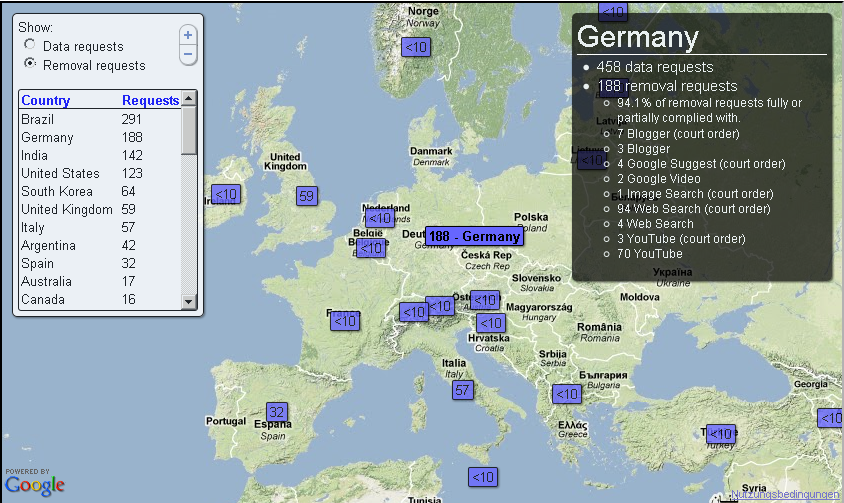Archive for the ‘good practice’ Category
 |
4. May 2010 – 15:07 by Madarász Csaba
|
(via groupwire)
The Intergovernmental Solutions Newsletter on Government by Collaboration is now available from the GSA Office of Citizen Services and
Communications. This edition presents the views of 22 trendsetting IT leaders of nations, states, federal agencies, and municipalities and
thought leaders who are working to ensure openness in Government.
Government by Collaboration is the third newsletter in a series highlighting each of the three areas in President Obama’s Open Government
Directive–transparency, citizen engagement and collaboration.
The many contributors include:
Dave McClure, Associate Administrator, GSA Office of Citizen Services and Communications
Dr, Mechthild Rohen, Head of ICT for Government and Public Services, European Commission
Bill Eggers and John O’Leary, Co-Authors, If We Can Put a Man On the Moon
Steve Ressler and Andrew Krzmarzick, GovLoop
Mary Davie, Assistant Commissioner, GSA Federal Acquisition Service
Tamara Erickson, Managing Director, nGenera Collaboration Services
Bev Godwin, Director of New Media and Citizen Engagement, GSA Office of Citizen Services and Communications
Bill Greeves and Pam Broviak, Co-founders, Munigov2.0
Ken Theis, CIO, State of Michigan
John Kamensky, Senior Fellow, IBM Center for the Business of Government
download the document in pdf
Posted in News, good practice | No Comments »
 |
29. April 2010 – 15:10 by Rolf Luehrs
|
 Steve Ressler works as an information technology specialist at the US Immigration and Customs Enforcement.
Steve Ressler works as an information technology specialist at the US Immigration and Customs Enforcement.
In 2008 Steve founded GovLoop.com - currently the most successful social network for civil servants and people interested in public administrations.
PEP-NET: Steve, can you explain in a few sentences what Govloop is all about?
Steve Ressler: GovLoop is the “Facebook for Government” - a social network connecting almost 30,000 public sector innovators to share best practices and ideas to improve government. Membership is free and check it out at govloop.com.
PEP-NET: How did you manage to make the network that popular?
Steve Ressler: I never imagined it would be 30,000 members when it started. I think it became popular for a few reasons:
- It serves a need that isn’t been met. The need to collaborate among gov’t peers. And when people saw it they told their friends.
- We always have fun and be authentic.
- We continue to listen to the community every day and make changes to meet their needs.
- One of the benefits of the GovLoop platform is that public administrations worldwide can exchange best practices.
PEP-NET: Has the GovLoop model itself been adopted elsewhere? Read the rest of this entry »
Posted in Interview, Projects, good practice | 1 Comment »
 |
26. April 2010 – 16:14 by John Heaven (TuTech Innovation GmbH)
|

Wordle, created with wordle.net
If you have something to say about eParticipation in Central and Eastern Europe, you can still participate in the online discourse. However, the forum has closed and we have now created summaries of the discussion. Anyone can edit the summaries using Google Docs, meaning that you still have a chance to contribute until May 7th. These documents will be submitted to the European Commission in a situation paper.
Read the rest of this entry »
Posted in Events, News, Projects, Uncategorized, good practice | No Comments »
 |
21. April 2010 – 11:37 by Bengt Feil (TuTech Innovation GmbH)
|
When we talk about transparency of government data we mostly mean data produced be government (in parliament etc.) which should be public and usable by NGOs and citizens alike. But there is another aspect of transparency which is discussed less often: How are governments using laws and power to request private data from companies and especially web-based companies like search engines and social networks?
Google published all requests for data and removal of content by governments in the second half 2009 on a website . The screenshot below shows the map on that site zoomed to Europe but there is data available for many other countries in the world.
 Click to enlarge
Click to enlarge
Some example numbers: In Germany there where 458 requests for private data and 188 request for removal of content in the second half of 2009. Ten of the removal requests where aimed that the Blogger service and 70 at Youtube. Interestingly Google also publishes the rate of compliance with these requests – which in this case is 94.1%. In other countries there were much more requests: Brazil leads the chart with 3663. For China however no data is available – or as Google says: “Chinese officials consider censorship demands as state secrets, so we cannot disclose that information at this time.“
This shows that there are other sides to government transparency than one might think about immediately. I hope other companies also publish this kind of data in such an accessible way so that we can hold our governments to task for extensive use of laws and power.
Posted in News, good practice | No Comments »
 |
20. April 2010 – 18:08 by Rolf Luehrs
|

The first step for governments or public administrations considering setting up an eParticipation project or making use of social media for the public sector is to see what others have put in place already. But where can you find information about existing cases, tools that fit your project or even a service provider?
Here are some entry points:
ePractice.eu
ePractice.eu is a portal created by the European Commission which offers services for the professional community of eGovernment, eInclusion and eHealth practitioners. It is an interactive initiative that empowers its users to discuss and influence open government, policy-making and the way in which public administrations operate and deliver services.
Part of the portal is a database providing descriptions of cases from the different domains. If you look for cases dealing with eParticipation, eDemocracy or eVoting you have to choose the right filters (Browse by domain: eGovernment; Browse by topic: eParticipation, eDemocracy and eVoting). After that you will be presented with about 130 cases from numerous EU countries, some of which are definitely worth reading.
e-participation.net & e-participation.it
e-particpation.net was initiated by PEP-NET founding member politik digital together with the British Council. The idea was to cover cases in Germany and the UK in the first place and more than 200 projects have been listed. Unfortunately the database has not been updated since the BC funding ran out in 2009. However, it is still an interesting archive and a source of inspiration: PEP-NET member Francesco Molinari set up a copycat covering only Italian cases in Italian language. He has since collected more than 150 cases.
ParticipateDB
ParticipateDB is a collaborative catalogue of online participation tools initiated by Tim Bonnemann’s Intelletics. Although still in the “closed alpha“ phase, 134 tools, 166 projects and 70 references can be browsed by any visitor.
Participedia
Participedia is a wiki page collecting “narratives and data about any kind of process or organization that has democratic potentials”. It is not at all limited to eParticipation but quite a lot of the described cases belong to this domain.
PDF’s “who to hire”
The US based personal democracy forum (PDF) recently published the “Who to Hire” guide providing an in-depth look at 40 firms offering technology tools to clients across the political spectrum. The guide has up-to-date descriptions of each company’s software and services. It contains examples of current political clients and the results of a survey of their network of online politics professionals that the initiators used to rate each company’s pricing, software and service. The online guide is only free for PDF members – others have to pay 75$. However, PDF provides a free executive summary.
Tiago Peixoto’s participatory budgeting map
In case you are interested in participatory budgeting you should have a look at the Google map Tiago has set up. This is to my knowledge the most comprehensive collection of case studies both with and without online support
PEP-NET
Last but not least we have collected quite a lot of blogposts introducing cases and tools. Just browse by category:
tools
projects
good-practice
Does anybody know other sources? Would be happy to get some hints in the comments…..
Posted in Projects, Tools, good practice | 2 Comments »
 |
15. April 2010 – 17:54 by Institute for Electronic Participation
|
A number of civil society e-participation projects has emerged in recent years in Slovenia aiming to strengthen civil dialogue and utilize the internet to support participatory democracy. This is a 2nd contribution to the CEE CN background paper provided for the PEP-NET on-line consultation “eParticipation in Central and Eastern Europe: The big questions” (available in pdf file at the Institute for Electronic Participation web site).
The article is providing a short description of the most visible of recent e-participation initiatives implemented by the non-governmental organizations in Slovenia including:
1. Citizen’s forum European Debates (https://www.evropske-razprave.si/)
2. NGO’s e-Participation portal during the Slovenian EU Council Presidency (https://www.predsedovanje.si/)
3. Open-source NGO’s e-Participation platform for on-line civil dialogue (https://www.sodeluj.net/)
4. Slovenian Civil Society e-Participation web service (https://www.e-participacija.si/)
Simon Delakorda, M.Sc.
Institute for Electronic Participation
Web: https://www.inepa.eu
Posted in Projects, Tools, good practice, members | No Comments »
 |
15. April 2010 – 11:41 by John Heaven (TuTech Innovation GmbH)
|

[See the full text and summary of the Live Chat on www.internet-discourse.eu]
Despite the turmoil surrounding his recent arrest, Marko Rakar has kindly agreed to take part in a PEP-NET live chat about eParticipation in Central and Eastern Europe. Marko, winner of the 2009 eDemocracy Award, founded the Croatian blog pollitika.com, which has a monthly readership of 150,000 and where 2,000 articles are published every year.
The live chat will take place from 10:30-12:00 CET this Friday, 16th April, as part of PEP-NET’s Online Discourse on eParticipation in Central and Eastern Europe.
Marko has been in the headlines in the past few days because he was accused of publishing a list of Croatian war veterans, which is a state secret. He categorically denies involvement and emphasises that he voluntarily went to police when he found out about rumours circulating on the internet suggesting that he was behind the site. You can read his description of events on his blog.
Marco was not charged for any crime. Investigations to find out who is responsible for posting information about Croatian war veterans’ continue.
Read the rest of this entry »
Posted in Uncategorized, Visions, good practice | 1 Comment »
 |
15. April 2010 – 11:38 by Dorothee Ruetschle (TuTech Innovation GmbH)
|
Am Montag, den 12. April 2010 startete die PEP-NET online-Diskussion zum Thema “online Bürgerbeteiligung in Zentral- und Osteuropa. Zahlreiche Teilnehmer diskutieren aktiv über Fragen rund um Möglichkeiten und Herausforderungen der Bürgerbeteiligung-online (ePartizipation). Ziel der 14-tägigen Diskussion ist die Entwicklung von Grundsätzen, wie das Instrument der online-Bürgerbeteiligung öfters angewandt werden kann und wie die Herausforderungen gemeistert werden können. Sie sind herzlich eingeladen teilzunehmen!
Die von PEP-NET initiierte und moderierte Diskussion wird in mehreren Phasen verlaufen: Zunächst identifizieren die Teilnehmer aktuelle Themen. Anschließend dürfen die Teilnehmer in Live-Chats prominente Gäste aus der ePartizipation-Szene befragen. Wir freuen uns auf spannende Dialoge!
Read the rest of this entry »
Posted in Events, Interview, News, good practice | No Comments »
 |
6. April 2010 – 19:53 by Institute for Electronic Participation
|
Different on-line strategies have been employed by the non-governmental organisations in Slovenia in order to strengthen public participation on health issues. Health NGOs websites, e-petitions, e-forums and social networking tools are aiming at supporting various dimensions of public health dialogue like information provision, public discussion and generating grass roots support. For the purpose of assessing participatory impact of those on-line initiatives, several practical cases from health NGOs (on-line Citizen’s forum on Cancer issues, on-line petition for Tobacco Euro, Facebook Health NGOs site etc.) are presented and discussed in the context of current e-participation developments at the EU level.
Presentation slides are available at the Institute for Electronic Participation web site
https://www.inepa.si/images/stories/health_ngos_e-participation_iniatives_in_slovenia-delakorda.pdf (pdf, 2.10 mb). Presentation delivered at “Building Public Health Dialogue and the Role of Health NGOs in the Republic of Slovenia and the EU” international conference, organized by the the Slovenian Coalition for Tobacco Control on 26th of March 2010 in Ljubljana.
More information:
“Building Public Health Dialogue and the Role of Health NGOs in the Republic of Slovenia and the EU” conference programme
https://www.tobak-zveza.si/datoteke/novice/NVO%20novice/Conference%20programme.pdf
The NGOs Protect our Health project
https://www.tobak-zveza.si/default.asp?lang=en&tip=vsebina_seznam_2&str=194
Simon Delakorda, M.Sc.
Institute for Electronic Participation
Web: https://www.inepa.eu
Linkedin: https://www.linkedin.com/in/simondelakorda
Facebook: https://sl-si.facebook.com/zavod.inepa
Twitter: https://twitter.com/simondelakorda
Slideshare: https://www.slideshare.net/Simon_Delakorda
ePractice: https://www.epractice.eu/people/simondelakorda07
Posted in Partners, Projects, Tools, good practice | No Comments »
 |
6. April 2010 – 18:11 by John Heaven (TuTech Innovation GmbH)
|

Photo by blackcustard on Flickr
Gordon Brown, UK Prime Minister, asked the Queen to dissolve Parliament today; so there will be a general election on May 6th. Hence, this is an election special edition of the PEP-NET News Digest. I’ll separate it into two parts: articles relating to the UK election and others.
Read the rest of this entry »
Posted in Uncategorized, good practice | 1 Comment »

 Steve Ressler
Steve Ressler












